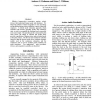Free Online Productivity Tools
i2Speak
i2Symbol
i2OCR
iTex2Img
iWeb2Print
iWeb2Shot
i2Type
iPdf2Split
iPdf2Merge
i2Bopomofo
i2Arabic
i2Style
i2Image
i2PDF
iLatex2Rtf
Sci2ools
121
click to vote
ICIA
2007
2007
Intent Recognition for Human-Robot Interaction
Effective human-robot cooperation requires robotic devices that understand human goals and intentions. We frame the problem of intent recognition as one of tracking and predicting human actions within the context of plan task sequences. A hybrid mode estimation approach, which estimates both discrete operating modes and continuous state, is used to accomplish this tracking based on possibly noisy sensor input. The operating modes correspond to plan tasks, hence, the ability to estimate and predict these provides a prediction of human actions and associated needs in the plan context. The discrete and continuous estimates interact in that the discrete mode selects continous dynamic models used in the continuous estimation, and the continuous state is used to evaluate guard conditions for mode transitions. Two applications: active prosthetic devices, and cooperative assembly, are described.
Related Content
| Added | 02 Oct 2010 |
| Updated | 02 Oct 2010 |
| Type | Conference |
| Year | 2007 |
| Where | ICIA |
| Authors | Andreas G. Hofmann, Brian C. Williams |
Comments (0)

